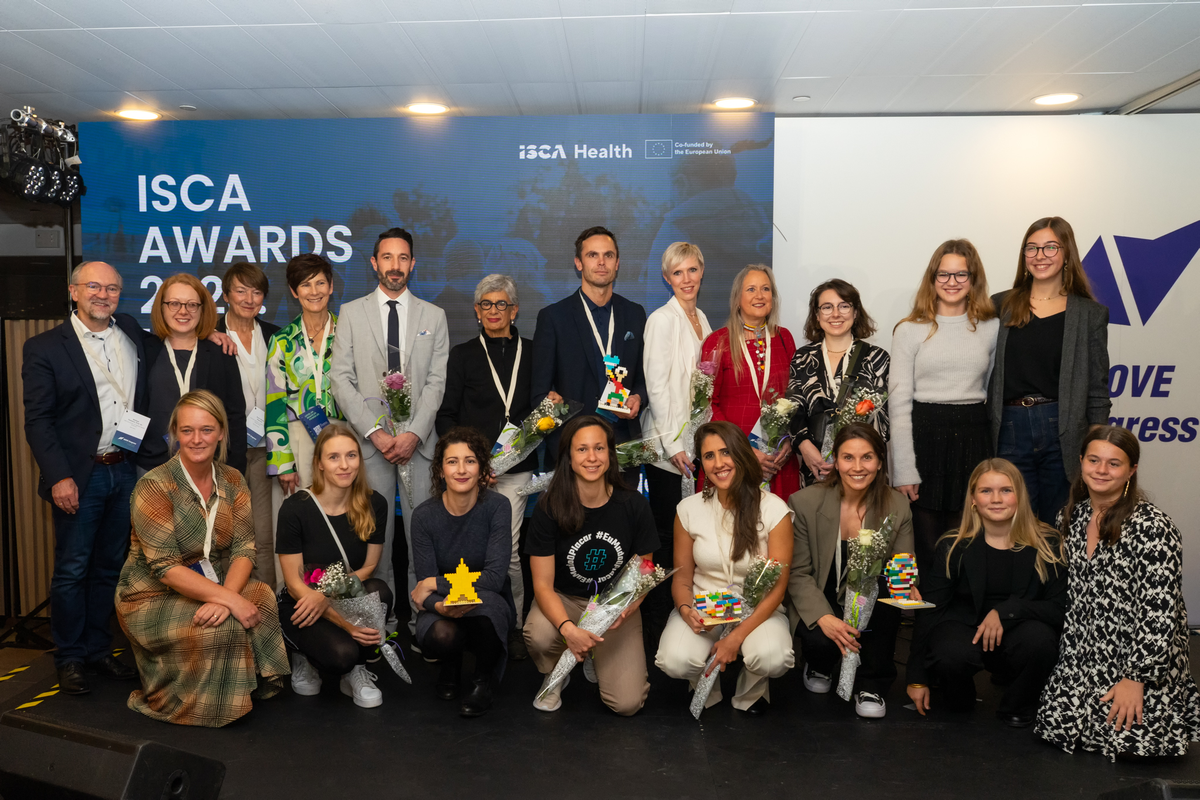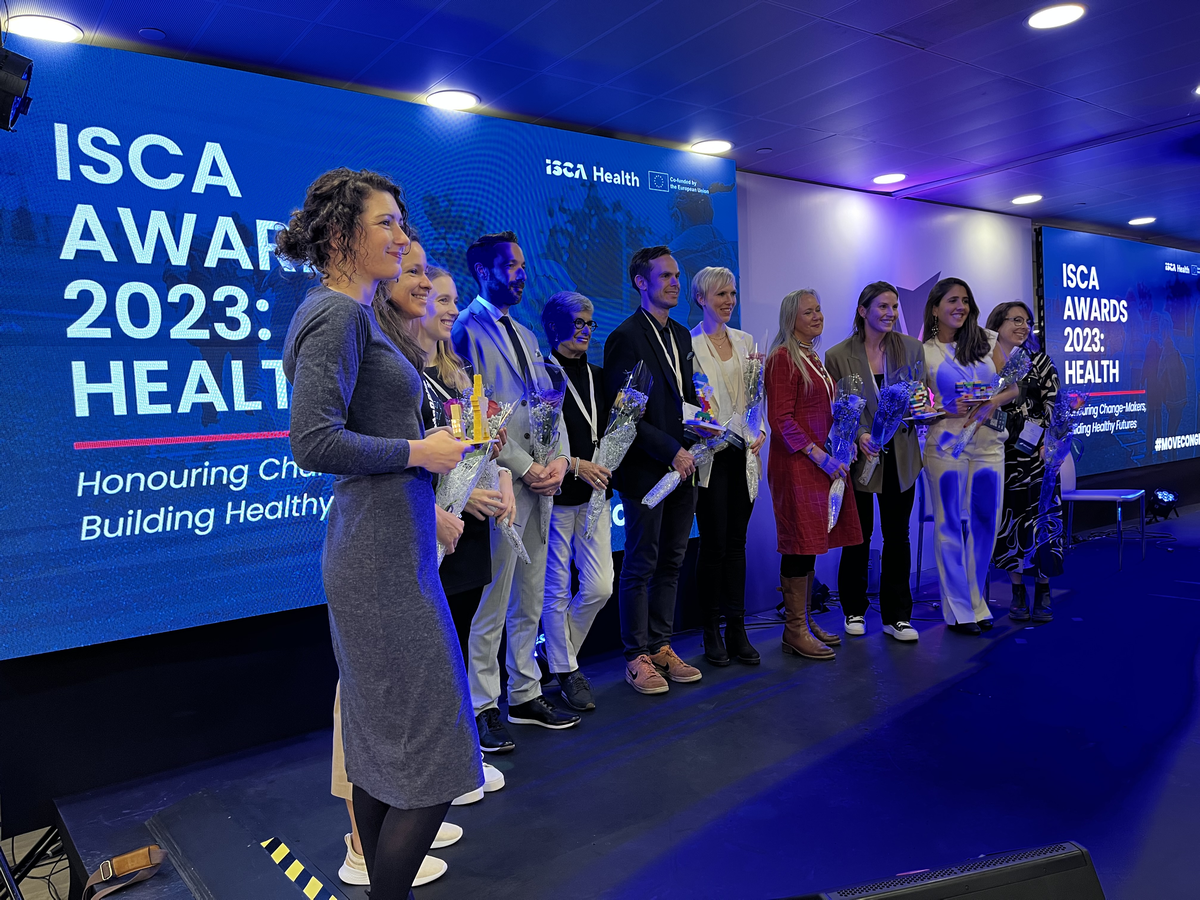
Outstanding initiatives and role models in physical activity and health awarded at MOVE Congress opening
This year’s winners of the ISCA Awards recognising and celebrating outstanding initiatives and role models in the field of Health-Enhancing Physical Activity (HEPA) have been revealed at the opening of the MOVE Congress in Madrid, Spain. The 12 shortlisted nominees travelled from three continents to attend the ceremony, after having been selected for their stand-out applications among 55 eligible organisations and individuals nominated.
Brazilian organisation Luta pela Paz won the Physical Activity and Mental Health Award; Youth Sport Trust UK’s Move and Groove initiative won the Physical Activity and Healthy, Active Ageing Award; the Estonian University of Tartu’s Move Lab took out the Health-Promoting Schools Award; and Marina Draskovic, Judo club for people with disabilities FUJI, Croatia, was awarded the people’s choice ‘Role model in health for socially disadvantaged groups’.
The winners were revealed by four of the jury members who had been part of making the final selection in three categories. The winner of the fourth category, the Role Model Award, was selected through a public vote. To avoid bias in the voting, the jury members with potential conflicts of interest in particular categories did not vote in those respective categories.
For the third edition in a row of the ISCA Awards, the unique trophies were made from Lego, this time by children from local international school Liceo Europeo. ISCA Awards coordinator Liina Seep invited four of the students to the stage to introduce themselves and present the awards.
All shortlisted nominees received a trip to Madrid to take part in the whole of ISCA’s MOVE Congress on 15-17 November 2023, and the winners each received a cash prize of 3000 euro. At ISCA, we are delighted to have had the opportunity to award best practices and role models again, this time in the field HEPA thanks to support from an EU Operating Grant in the Field of Health.
You can see the full list of all eligible applicants, nominees and award winners here.
Visit ISCA Health

Award 1: Physical activity and mental health
Winner: Luta pela Paz (Brazil)
Finalists: Intelligent Health (UK), Yoga and Sport with Refugees (Greece) (Watch the video of all finalists here)
Jury member/award presenter: Niamh Murphy, Waterford Institute of Technology, Ireland
Luta pela Paz (LPP) uses sport as a tool to respond to the urgent need to improve access to mental health support for youth in the Maré favela in Rio. Youth from Maré face high levels of poverty, inequality and discrimination, and extremely high levels of armed violence: a 2021 study revealed 62% of Maré residents always or often feared being shot. Despite this, only 2% of national health budget is spent on mental health and youth from favelas are least likely to access what support exists. LPP uses boxing and martial arts to improve young people’s mental well-being, and as an entry point to provide destigmatising workshops and tailored psychological support through Care Diaries, a methodology using a social-media inspired activity book to support youth to reduce symptoms of anxiety and depression.
Award 2: Physical activity and healthy, active ageing
Winner: Youth Sport Trust (UK)
Finalists: German Gymnastics Federation (Germany), Lunga Vita Attiva Aps (Italy) (Watch the video of all finalists here)
Jury member/award presenter: Michael Tiemann, SRH University of Applied Health Sciences, Germany
Move and Groove is an innovative intergenerational project combining the worlds of music and sport to deliver health and wellbeing outcomes for young and older generations. Working with 10 UK schools and care homes, Youth Sport Trust and Intergenerational Music Making trained schoolteachers and care staff to lead intergenerational physical and music activities in care homes bringing joy to old and young alike. Using sports equipment, musical instruments and session delivery guides, Children from 4-16 years old joined in, encouraged and sometimes led weekly fun activities for their new older friends over 6-weeks. The impact on the older people (mean age, 83 years) was clear. Self-reported positive mood increased while negative mood, loneliness, depression, anxiety, and stress decreased.
Award 3: Health-promoting schools
Winner: University of Tartu’s Move Lab (Estonia)
Finalists: University of Bradford (UK), Mathare Girl Power Project (Kenya) (Watch the video of all finalists here)
Jury member/award presenter: Rose-Marie Repond, Bern University of Applied Sciences, Switzerland
Schools in Motion (SIM) is a programme that supports schools in integrating physical activities into every school day, including active travel to and from school, as well as movement during and in between lessons, both in and outdoors. It helps movement gain a greater foothold in school culture. Already 203 schools in Estonia have joined to SIM (35% of general schools), varied in location and size (from 17 to 1600 pupils, in the countryside, small and large towns), including schools for children with different native language and with special education needs.
Award 4: Role model in health for socially disadvantaged groups (citizens’ choice)
Winner: Marina Draskovic, Judo club for people with disabilities FUJI, Croatia
Finalists: Aneta Grabmüller Soldati, Naplno, Czech Republic, Layana Souza, Changing the Score (Mudando o Placar), Brazil (Watch the video of all finalists here)
Jury member/award presenter: Ine De Clerck, Artevelde University of Applied Sciences, Belgium
As a former professional judoka and long-time member of the Croatian Judo National Team, Marina Drašković is breaking down participation barriers in judo and is creating new standards of sports inclusion not just in Croatia, but across the whole of Europe. In 2012 she founded the Judo Club for People with Disabilities Fuji, bringing together children and young people with cerebral palsy, Down syndrome, intellectual disabilities, motor difficulties, autism spectrum disorders and others. Youth with disabilities are among the most vulnerable groups in society. By becoming head of the Adapted Judo programme within the European Judo Union (EJU), Marina is climbing new heights and laying the foundation for the development of adaptive Judo all over Europe.
Visit the ISCA Awards website for more information



Camilla Borgan
Congratulation!